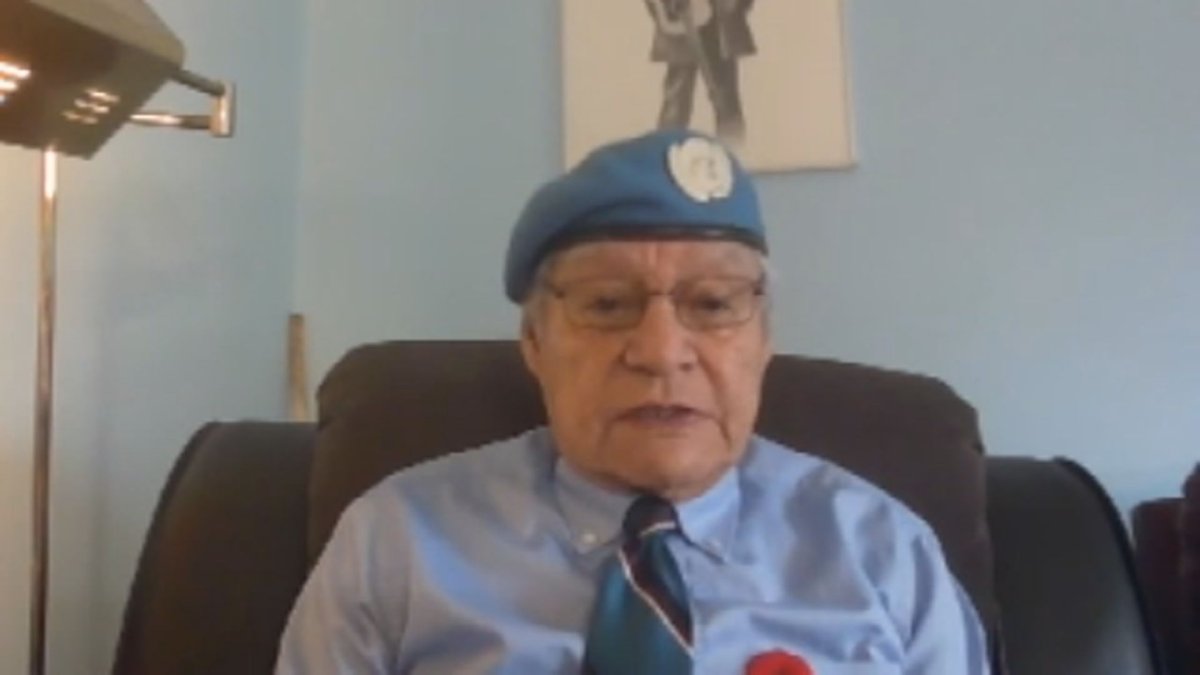Steven M. Ross from the Montreal Lake Cree Nation was 18 years old when he first enlisted to the Canadian Armed Forces in 1965. With hopes of searching for a job, he happened to walk by a recruiting office in Saskatoon and decided to speak with a recruiting officer. And the rest is history.

Ross served for the Queens own Rifles of Canada. His tour of duty included United Nations Peace Keeping Duty in Cyprus. Ross was elected to the Saskatchewan First Nations Veterans Association (SFNVA) to serve as the Grand Chief on March 31, 2015, up until 2021. Ross is also a residential school survivor and learned to implement his skills in the army.
Global News’ Jeanelle Mandes sat down with Ross to talk about the importance of National Indigenous Veterans Day.
Jeanelle Mandes: How was the experience for you serving for the Canadian Armed Forces?
Steven Ross: The experience was exciting … the experience was just amazing because when you’re enlisted in the Armed Forces, you’re totally trained with whoever was there. I trained with people from the East Coast to the west. Young people, my age (and) some were a little bit older. It was phenomenal because we were equal. I really enjoyed it.
Jeanelle Mandes: What was it like going from the (Indian) residential school to the army?
- Budget 2024 failed to spark ‘political reboot’ for Liberals, polling suggests
- Train goes up in flames while rolling through London, Ont. Here’s what we know
- Peel police chief met Sri Lankan officer a court says ‘participated’ in torture
- Wrong remains sent to ‘exhausted’ Canadian family after death on Cuba vacation
Steven Ross: Going to residential school. You’re disciplined. You’re taught how to bond in line. You’re taught how to work in groups and the discipline as well. So, when I moved from the residential school to the armed forces, it was a little bit easier for me. I understood getting along. I understood working as a team.
Jeanelle Mandes: What does National Indigenous Veterans Day mean for you?
Steven Ross: Well, it means that finally our First Nations veterans are being recognized by the state, which has never really happened or occurred before. So, it’s really good that we’re finally getting to the point where we’re starting to work together and to live together in this country. And that’s what it’s all about. So, it’s a recognition: we should also remember First Nations. They went to war as well. They volunteered. It’s really an honor.
Jeanelle Mandes: What sort of things were Indigenous veterans left out of?
Steven Ross: I can only speak for those people are the World War One or two. The veterans themselves when they’re in the Canadian Armed Forces, (they) are equal to everybody else. So, there was very little discrimination or very little that I was aware of. Working with the regular troops, there were some things that I (could do) better than they can, but going back to the real veterans that have seen action there, the bravery there, the courageous ones, they jumped in the line of fire for our country, for the Queen, for the Treaties, for freedom, for peace. And I always tell people if you enjoy your freedom (and) enjoy the peace we live in now, we can walk anywhere in this country without fear, thank a veteran.
Jeanelle Mandes: In the era of reconciliation, how do people perceive Indigenous veterans to this day?
Steven Ross: They recognize veterans. They’re recognized as people that have made a contribution to this country and made a contribution in our land. There is much more education in the area of truth, reconciliation. People have to understand. People have to know what happened, what really happened at the (residential schools), what really happened in the armed forces after veterans left who left and went back to civilian life because it was almost the genocide. It’s a good day of education, especially our students, our people at home, the communities, our relatives, to let them understand what we want, the ceremonies (to) tell our stories and they begin to understand … that’s why we need to remember and honor those people that never return (who) fought for our freedom.





Comments